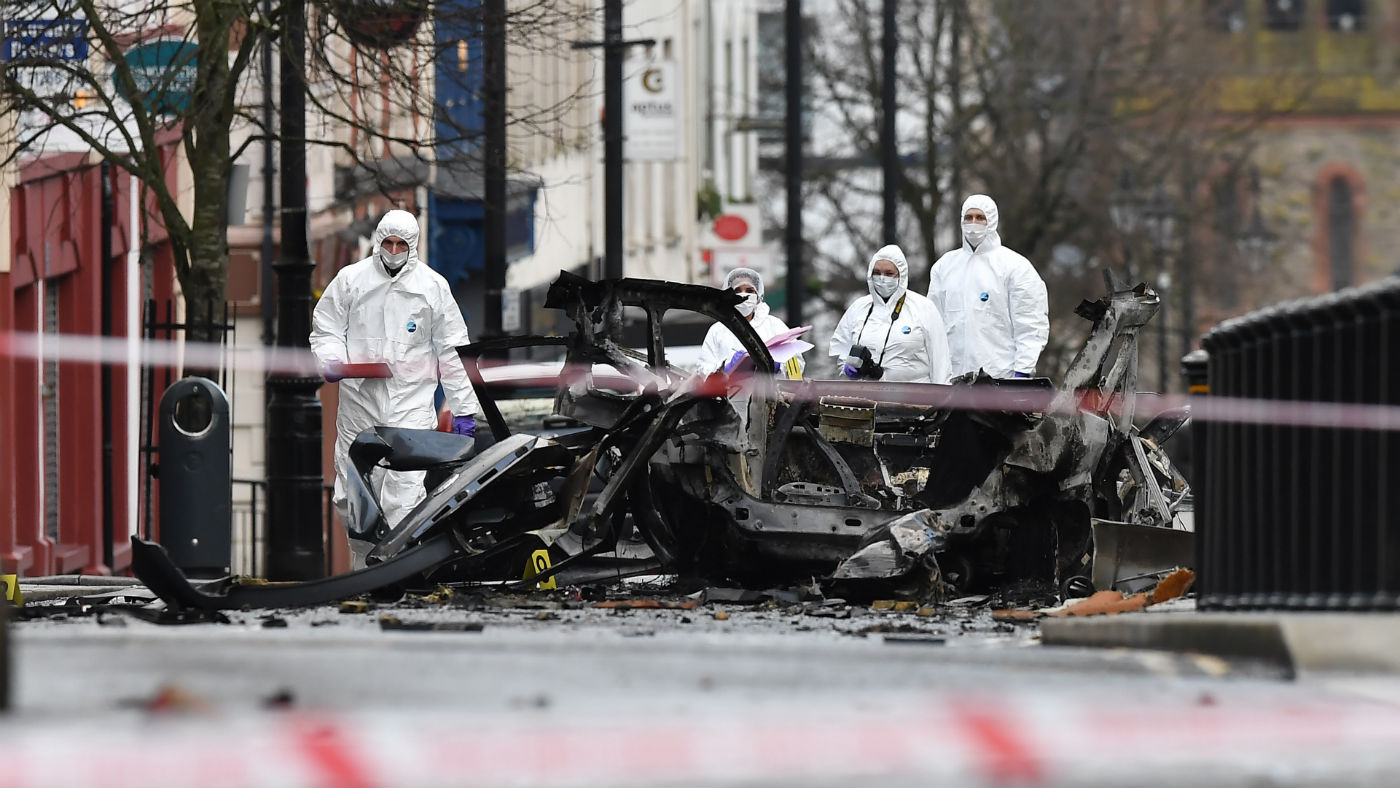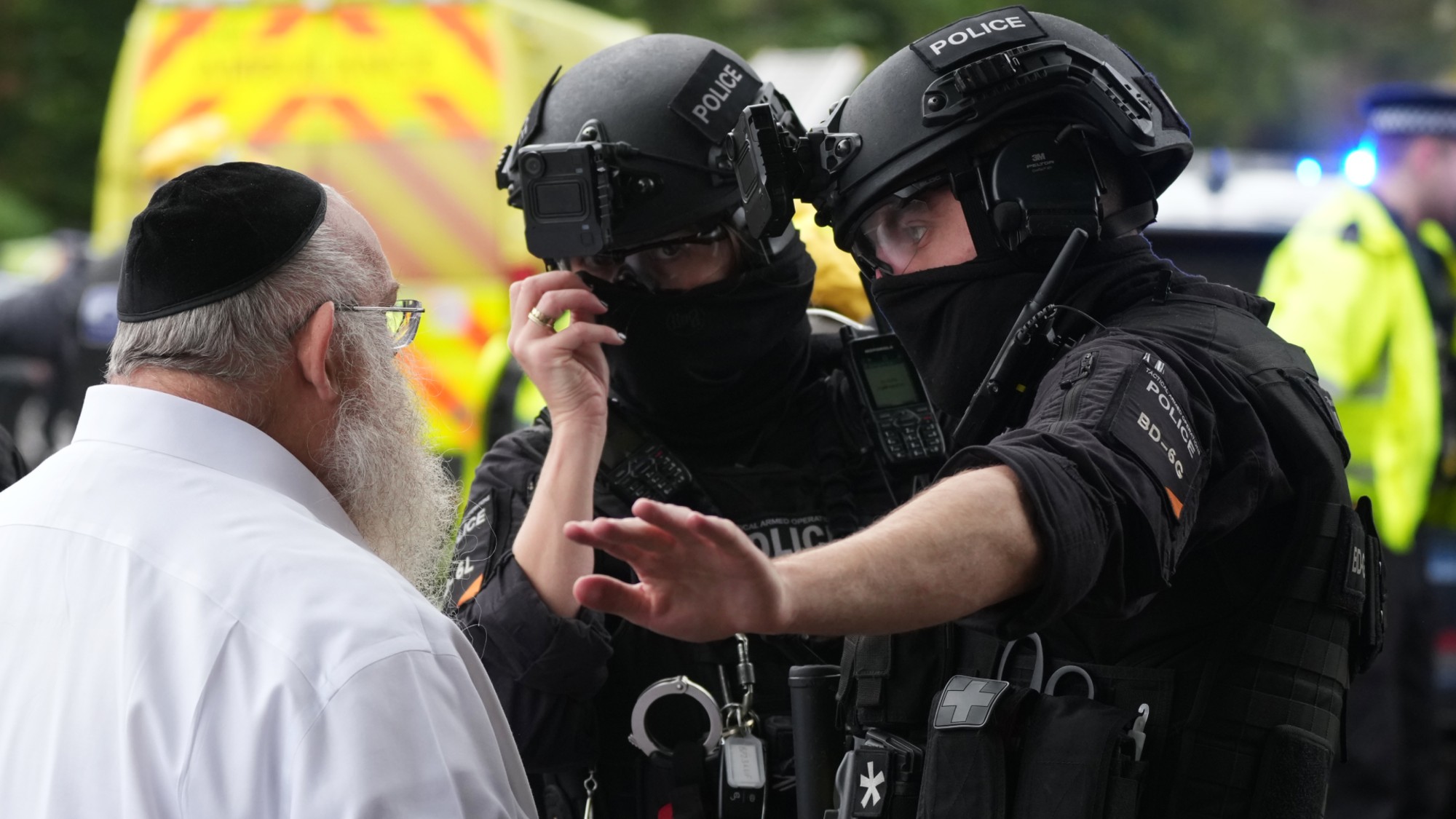New IRA blamed for Londonderry car bomb
Fears latest terror attack could be prelude to renewed violence in the event of a hard border post-Brexit

A free daily email with the biggest news stories of the day – and the best features from TheWeek.com
You are now subscribed
Your newsletter sign-up was successful
A suspected New IRA car bomb that exploded outside a courthouse in Londonderry on Saturday has prompted widespread condemnation and fears it could be a prelude to renewed violence in Northern Ireland after Brexit.
The Police Service of Northern Ireland (PSNI) claim at least two armed men hijacked a pizza delivery car and installed a bomb inside, which was then driven to the location before it was detonated.
The Belfast Telegraph reports that, “a bomb warning phone call was made to the West Midlands Samaritans who then informed West Midlands Police who in turn passed the information to the PSNI.”
The Week
Escape your echo chamber. Get the facts behind the news, plus analysis from multiple perspectives.

Sign up for The Week's Free Newsletters
From our morning news briefing to a weekly Good News Newsletter, get the best of The Week delivered directly to your inbox.
From our morning news briefing to a weekly Good News Newsletter, get the best of The Week delivered directly to your inbox.
The PSNI managed to evacuate the surrounding area within 30 minutes of the car being left outside the court house. No one is believed to have been injured in the attack.
Assistant Chief Constable Mark Hamilton confirmed that two men in their twenties had been arrested in connection with the bombing. He told reporters: “For this investigation, our main line of inquiry is against the ‘New IRA’. The New IRA like most dissident Republican groups in Northern Ireland are small, largely unrepresentative and just determined to drive people back to somewhere they don't want to be.”
The New IRA was formed in 2012 after a number of dissident republican groups said they were unifying under one leadership.
The attack was condemned by policians from across the political spectrum. Gary Middleton, the Democratic Unionist Party former deputy mayor of Londonderry, described the incident as a “disgraceful act of terrorism” and “a throwback to the past”.
A free daily email with the biggest news stories of the day – and the best features from TheWeek.com
Sinn Fein, the former political wing of the nationalist Irish Republican Army, also condemned the bombing, with MP Elisha McCallion saying it had “has shocked the local community.”
CNN’s international diplomatic editor, Nic Robertson, tweeted the explosion was a “level of violence unseen here in years”.
CNN reports that “the bombing raised fears that sectarian violence might be revived in Northern Ireland, which has been split over the question of whether to remain part of the United Kingdom or become part of Ireland”.
The Good Friday Agreement signed in 1998 ended nearly 30 years of conflict between protestant loyalists and catholic republicans, in which more than 3,500 people died.
Since then the country has made huge strides towards reconciliation, yet there are growing fears the return of a hard border between north and south after Brexit could see renewed violence. Police in both Northern Ireland and the Irish Republic have warned that a return to a hard border, complete with customs and other checks, could be a target for militant groups.
Reuters reports that the New IRA, which is one of a small number of militant groups opposed to the Good Friday peace agreement, has carried out “sporadic attacks in recent years”. The last was back in 2016 when a prison officer was killed after a bomb exploded under his van in Belfast.
Last July, tensions flared again when police and fire officers came under petrol bomb and missile attack for a number of nights from Catholic youths in the Bogside area of Londonderry.
-
 What to know before filing your own taxes for the first time
What to know before filing your own taxes for the first timethe explainer Tackle this financial milestone with confidence
-
 The biggest box office flops of the 21st century
The biggest box office flops of the 21st centuryin depth Unnecessary remakes and turgid, expensive CGI-fests highlight this list of these most notorious box-office losers
-
 What are the best investments for beginners?
What are the best investments for beginners?The Explainer Stocks and ETFs and bonds, oh my
-
 How the ‘British FBI’ will work
How the ‘British FBI’ will workThe Explainer New National Police Service to focus on fighting terrorism, fraud and organised crime, freeing up local forces to tackle everyday offences
-
 How the Bondi massacre unfolded
How the Bondi massacre unfoldedIn Depth Deadly terrorist attack during Hanukkah celebration in Sydney prompts review of Australia’s gun control laws and reckoning over global rise in antisemitism
-
 Who is fuelling the flames of antisemitism in Australia?
Who is fuelling the flames of antisemitism in Australia?Today’s Big Question Deadly Bondi Beach attack the result of ‘permissive environment’ where warning signs were ‘too often left unchecked’
-
 ‘Stakeknife’: MI5’s man inside the IRA
‘Stakeknife’: MI5’s man inside the IRAThe Explainer Freddie Scappaticci, implicated in 14 murders and 15 abductions during the Troubles, ‘probably cost more lives than he saved’, investigation claims
-
 Ten years after Bataclan: how has France changed?
Ten years after Bataclan: how has France changed?Today's Big Question ‘Act of war’ by Islamist terrorists was a ‘shockingly direct challenge’ to Western morality
-
 Arsonist who attacked Shapiro gets 25-50 years
Arsonist who attacked Shapiro gets 25-50 yearsSpeed Read Cody Balmer broke into the Pennsylvania governor’s mansion and tried to burn it down
-
 Manchester synagogue attack: what do we know?
Manchester synagogue attack: what do we know?Today’s Big Question Two dead after car and stabbing attack on holiest day in Jewish year
-
 The Miami Showband massacre, 50 years on
The Miami Showband massacre, 50 years onThe Explainer Unanswered questions remain over Troubles terror attack that killed three members of one of Ireland's most popular music acts